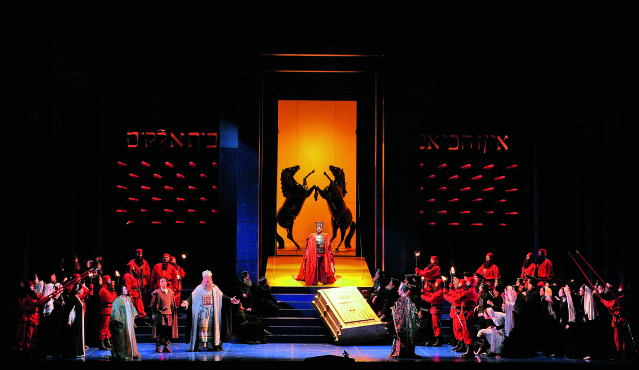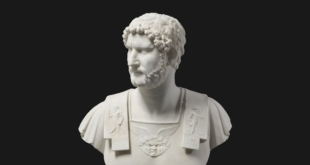
Giuseppe Verdi’s “Nabucco” is one of the most significant works of art ever created. Not only is its impact historic in launching Verdi’s successful career as an opera composer and so decidedly affecting the direction of Romantic opera, but it clearly had a historic impact on Italy and European politics. Indeed, it is difficult to imagine what Europe might look like even today if “Nabucco” had not been staged at La Scala in March 1842.
Perhaps the greatest miracle of “Nabucco” was that it was the work of a very troubled young composer — certainly a talented man, but one who had almost been crushed into obscurity by a pitiless series of depressing, heartbreaking and mightily discouraging circumstances. Having been told all his life how talented he was, Verdi had been rejected by the Conservatory of Music in Milan. Then it took him three long years of thankless hustling, brown-nosing and groveling to nobodies before he could get his first opera produced.
And then when it looked like he just might be on the threshold of success, his entire family died within a year-and-a half. And he still had to compose the music for a comic opera. Predictably this opera was a bust, which had to have been a severe blow to the 27-year-old Verdi, who was still trying to come to terms with the guilt he felt over losing his wife — the daughter of his great benefactor, Antonio Barezzi.
When discussing “Nabucco” (whose subject is based on the Bible), whether you’re religious or not, it’s hard to forget the old saying, “God works in mysterious ways.” What if German composer Otto Nicolai (trying to make a splash in Italy) had not rejected the libretto of “Nabucco?” But he did. And La Scala director Bartolomeo Merelli offered it to Verdi. Suppose the story is true — and when Verdi tossed the libretto on his table, it just happened to open to the page that contained the lines, “Va, pensiero, sull’ali dorate?” Mere chance? And what if La Scala had not produced the ballet, “Nabucodonosor,” so that most of the sets and costumes four years later for an opera of the same name and subject would not have to incur significant costs? Prima donna Giuseppina Strepponi and star baritone Giorgio Ronconi were contracted to La Scala in 1842 and they were so inclined to sing “Nabucco” that they ganged up on Merelli to make sure he produced it in the 1842 schedule. Another quirk?
When “Nabucco” premièred at La Scala the public reception to it was unprecedented. Simply no one had ever heard anything like it in the opera house before. As I’ve said on other occasions it was as if Beethoven had come back to life and had finally learned how to compose Italian opera. Vincenzo Bellini had been dead for some years, but Donizetti was at the absolute zenith of his career (although the insidious disease which was to take his life was already starting to eat away at him). Meanwhile, Rossini in Paris was still considered the Grand Old Man (at 50!) of Italian opera when “Nabucco” was first staged.
From that point on, however, it was Verdi who was unquestionably the King of Opera. As a matter of fact, after Beethoven’s passing in 1827, Verdi became the composer whose services were most in demand in a century filled with great composers. As far as opera was concerned, “Nabucco” signaled a new direction for the art — a greater role for choruses and male characters in a sphere that had recently been totally dominated by prima donnas, one of whom was Giuseppina Strepponi.
One of the great changes wrought by all the tumultuous social and political turbulence of the late-18th century was that for the first time in Western culture in thousands of years, women could sing and act on stage in public. Audiences could not get enough of this novelty, so prima donnas were very much in demand. Strepponi wasn’t the very best of these but she was a good one, and had plenty of work all over Italy. Unfortunately she had bad luck with men and bore several illegitimate children — each time losing something from her health and her voice. Her weak vocal state was of such alarming concern that Verdi himself wanted a different soprano to sing “Nabucco’s” Abigaille — to no avail. Shortly after the première of Verdi’s breakout work, Strepponi retired to teach singing in Paris.
After Strepponi exited the opera stage after creating her most important role, the appeal and influence of the prima donna did not diminish appreciably — one only need consider the titles of Puccini’s greatest works to see that the musical and dramatic focus of opera was still given substantially to female characters. Yet the end of her performing career was still one more indication that the Golden Age of the Bel Canto had waned and the Verdi era was about to begin. Of course Strepponi’s relationship with the composer was far from over. After a relatively brief sojourn in Paris she began a love affair with Verdi (and ultimately became his second wife) that would last 50 years!
As for “Nabucco’s” political impact …Well, the idea of Italy becoming a liberated and unified nation was not new. In the high Renaissance, Machiavelli was all for it. He thought that the current Pope’s son, Cesare Borgia, would be the man to lead Italy to nationhood. Wrong! But there were always quite a few Italians in the following years and centuries who still believed in a free, united Italy. Many gave their lives for their patriotic views and actions.
The main problem with Italians getting together and throwing out foreign oppressors was that because of all the inter-city and inter-regional squabbling, betrayal and double dealing that had gone on for so long, it was common for Italians in one town to hate Italians in a rival town more than they hated foreigners! Interestingly Verdi was born at a time when Italy was unified — under Napoleon; the French had mostly been welcomed as liberators when they threw the Austrians and Spanish out in the early 1800s. Unfortunately the year of Verdi’s birth was 1813, when Napoleon’s army was on the run from the Russian debacle. Soon the Austrians regained control of the north of Italy and the Spanish-supported aristocrats and nobility once again ruled the south with an iron fist.
It seemed like things were back to Square One as far as Italian independence went. There were still patriots all over the sunny peninsula that yearned for their own free country. But resistance to the authorities was still as fragmented as ever. Most Italians loved opera, but so did the Austrians. If there were any single place where what one might call seditious talk was bandied about, it was the local opera house. With the Austrian military always providing a strong, visible showing, however, it is understandable how the most patriotic of souls were severely intimidated.
Then came “Nabucco.”
Neither Verdi nor librettist Temistocle Solera planned it that way, but the main reason the public went so mad for “Nabucco” is that they identified themselves with the opera’s downtrodden Jews and associated the Austrians with the drama’s oppressor Assyrians and Babylonians. This was an emotional expression that simply could not be contained. And this phenomenon occurred not only in Milan, but everywhere in Italy that “Nabucco” was produced. Almost overnight an entire nation that for centuries could not agree about anything, now found a collective voice in the music of Giuseppe Verdi.
It would still be a long, and oftentimes bloody, struggle before Italy was finally liberated and unified — almost 20 years. But what was that compared to all the centuries that Italy had been, as the Little Corporal so aptly put it, merely a “geographic expression?” And at the peak of the revolutionary strife it was common to see Verdi’s name scrawled on walls everywhere — an acronym for Vittorio Emanuele Re D’Italia. Furthermore, “Nabucco’s” chorus of Hebrew slaves, “Va, pensiero,” to which we’ve alluded above, became the unofficial battle hymn of the “Risorgimento,” as the revolutionary movement was called. (I have always felt that it has been a huge mistake not to make “Va, pensiero” the Italian national anthem!)
As an independent country no one can deny the impact Italy has had on the state of European and world political affairs — in the 19th century, and in the 20th, before, during and after both World Wars. Even today, with so much attention focused on the future of the Euro and the rapidly changing demographics of Europe, Italy is a key player on the world stage. And it all started with “Nabucco.”
Aside from its famous chorus “Nabucco” does not have nearly the number of familiar melodies that other Verdi operas have. Yet it retains a firm position in the standard repertoire, no doubt due to its historic importance. Chicago’s Lyric Opera is producing it this season with another work that changed the course of the art, “Le nozze di Figaro,” whose run is now over. But there is still plenty of time to get your seats to Verdi’s very important work.
LYRIC OPERA OF CHICAGO’S “NABUCCO” 2015-16
Nabucco — Željko Lučić
Abigaille — Tatiana Serjan
Zaccaria — Dmitry Belosselskiy
Fenena — Elizabeth DeShong
Ismaele — Sergey Skorokhodov
Conductor — Carlo Rizzi….
Director — Matthew Ozawa
Set Designer — Michael Yeargan
PERFORMANCE DATES
January 23, 27, 31
February: 6, 9, 12
For tickets or more info, visit www.lyricopera.org or call 312-827-5600
 Fra Noi Embrace Your Inner Italian
Fra Noi Embrace Your Inner Italian






